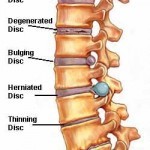By Arne Cherkoss
Degenerative Disc Disease
Degenerative Disc Disease, or DDD, is the degeneration of the disc between vertebrae, resulting in pain. Disc degeneration is a normal part of aging and for most people it is not a problem. Meaning, a person may have disc degeneration and be symptom free. Other people are not so lucky and the degeneration can cause severe chronic pain.
Symptoms of Degenerative Disc Disease
- chronic low back pain that can radiate into the hips or buttocks and thighs while walking
- sporadic tingling or weakness through the knees
- pain that may increase or be felt while sitting, bending, lifting and twisting.
Chronic neck pain can also be caused in the upper spine with pain radiating to the shoulders, arms and hands. Neck pain may cause interrupted blood supply to the brain resulting in headaches, vertigo and worsened cognitive abilities and memory.
Degenerative Disc Disease Treatment Options
Degenerative Disc Disease can be successfully treated without surgery. Treatment options may include one or more of the following:
- physical therapy
- chiropractic manipulative therapy and other chiropractic treatments
- osteopathic manipulation
- anti-inflammatory medications
- traction
- spinal injections
 Surgery may be recommended if one or more of the above treatments do not provide relief within a few months. The most common type of surgery to relieve Degenerative Disc Disease is a spinal fusion. However, there are numerous other surgical treatments for DDD.
Surgery may be recommended if one or more of the above treatments do not provide relief within a few months. The most common type of surgery to relieve Degenerative Disc Disease is a spinal fusion. However, there are numerous other surgical treatments for DDD.
Let your doctor know how you feel, where the pain is coming from, what makes it better and what makes it worse. Your doctor will likely recommend conservative treatment. Hopefully your symptoms will resolve with conservative treatment. If not, return to your doctor and see what your options are.

